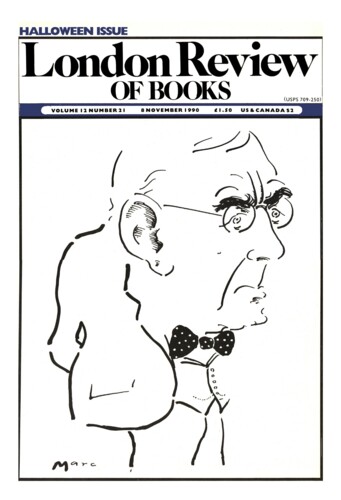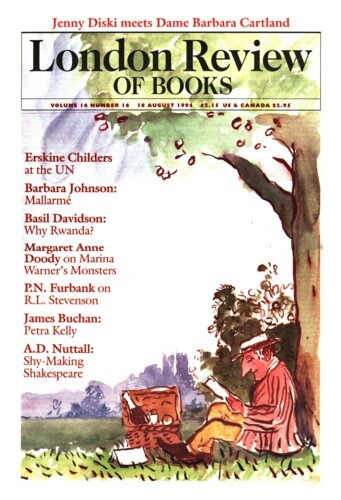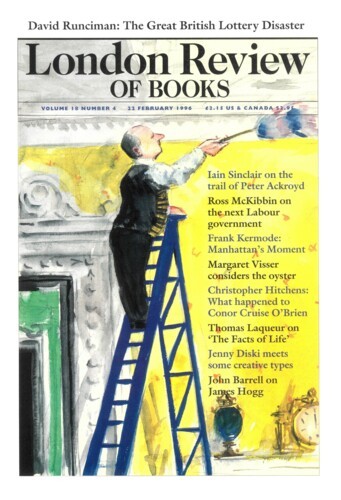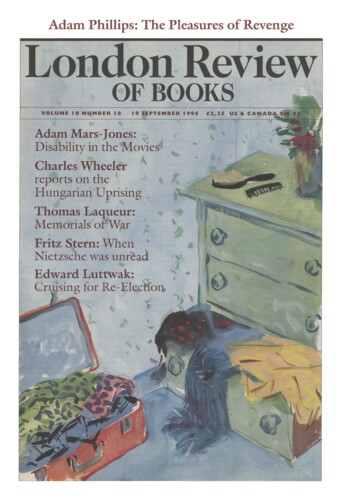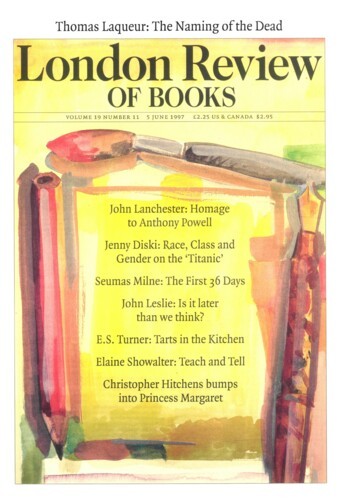Thomas Laqueur
Thomas Laqueur is emeritus professor of history at Berkeley. His most recent book is The Work of the Dead: A Cultural History of Mortal Remains.
Closing Time
Thomas Laqueur, 18 August 1994
‘He had never had a moment when death was not terrible to him,’ reports Boswell on the occasion of needling his famous friend with the news that the atheist philosopher David Hume had died well and without repentance. ‘The horror of death, which I had always observed in Dr Johnson, appeared strong tonight.’ Sherwin Nuland a surgeon from Yale, speaks to the Johnson in each of us, to our hunger for knowledge of our inevitable end: ‘Everyone wants to know the details of dying … we are irresistibly attracted by the very anxieties we find most terrifying.’…
Simply Doing It
Thomas Laqueur, 22 February 1996
The Facts of Life is symptomatic of the tensions to be found in its sources: it is an elusive book, offering vistas of liberation and oppression. In all but their barest outline the facts of life are not really facts, and ‘sexual knowledge’ does not, by and large, come to be known; while ‘creation’ is so protean a notion here as to encompass everything from 18th-century advice on married love, to 19th-century soirées where women told men about their sexual lives, to 20th-century anti-venereal disease campaigns. The book’s object never really comes into focus. Knowledge, finally, of what? The repeated promises of teen and women’s magazines, month after month, to reveal ‘The Secrets of Sex in just Ten Minutes’ (this in January’s Cosmopolitan) suggest that maybe there is nothing to tell, only telling itself.
The Past’s Past
Thomas Laqueur, 19 September 1996
We understand explicitly, as Nietzsche remarked in the Genealogy of Morals, what earlier generations felt in their bones: ‘Only that which does not cease to hurt remains in memory.’ Remembering and mourning demand that the past is somehow kept present; they demand recollection as the pain of immediate loss diminishes. And yet we – that is, we moderns – are also acutely aware of just how utterly past the past is, how historical it is, how even the worst horrors lose their sting. As Walt Whitman wrote of the Civil War:’
The Sound of Voices Intoning Names
Thomas Laqueur, 5 June 1997
In a happier age, Immanuel Kant identified one of the problems of understanding any of the genocides which come all too easily to mind. It is the problem of the mathematical sublime. The arithmetician has no more difficulty in principle comprehending one murder than 600,000 – the number murdered in the Armenian atrocities of 1916-17 or by Nazi Einsatzgruppen on the Eastern Front in 1941 before the death camps were fully geared up – or five to six million, the best estimates we have of the number of Jews murdered in the camps. At a purely cognitive level any number can be understood by adding, unit by unit, to the unit that comes before. But for Kant, the ability to take in great magnitudes – to feel their sublime terror – is ultimately an aesthetic act and one which depends on gaining the right distance from the subject. His example comes from a French general’s account of a visit to the Pyramids and his anxiety about how to feel the emotional effect of their sheer magnitude. Too close and we see only stone by stone without taking in the full sweep from base to peak; too far away and we lose the sublime wonder predicated on the sense that something so massive was made discrete block by discrete block.’
Pieces about Thomas Laqueur in the LRB
Back from the Underworld: The Liveliness of the Dead
Marina Warner, 17 August 2017
The dead present an enigma that can’t be grasped: they are always there in mind, they come back in dreams, live in memory, and if they don’t, that is even more disturbing, somehow reprehensible.
Too Much: a history of masturbation
Barbara Taylor, 6 May 2004
Lounging in a boat anchored near his home, daydreaming about a ‘pretty wench’ he’d spotted in Westminster earlier that day, Samuel Pepys became so aroused that he ejaculated...
Do women like sex?
Michael Mason, 8 November 1990
The other day I came across an article by Professor Laqueur, written some fourteen years ago, which makes a striking and dismaying contrast to the book he has just published. The contrast is...
Read anywhere with the London Review of Books app, available now from the App Store for Apple devices, Google Play for Android devices and Amazon for your Kindle Fire.
Sign up to our newsletter
For highlights from the latest issue, our archive and the blog, as well as news, events and exclusive promotions.
